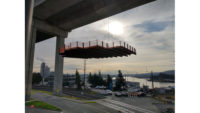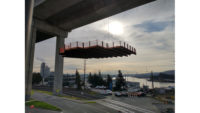The concrete strike in Seattle entered its fourth week, putting in jeopardy the openings of countless time-sensitive projects, including schools. No new talks are scheduled between the striking operating engineers Local 302 and the four major sand and gravel companies in King County, Washington.
Local 302 walked off the job when its contract expired July 31. Teamsters, who drive the concrete delivery trucks, decline to cross the picket lines. No ready-mix has been delivered for more than three weeks.
When the strike began, the union was asking for an $8-per-hour raise over three years, and the right to strike in sympathy with other unions.
At that point the four employers, Glacier Northwest, Cadman Co., Salmon Bay Sand and Gravel and Stoneway Concrete, offered a $3.95-per-hour raise over three years, but refused to approve the strike clause. Traditionally, the union has had the right to divide the increase among wages, pensions and medical benefits as it saw fit.
A federal mediator from Federal Reconciliation and Mediation Services could not resolve the differences, says Allan Darr, business manager for Local 302. “We are done with the mediator,” he says. “Right now attorneys on both sides are trying to work out the differences.”
The four employers and the federal mediator could not be reached for comment, but according to Darr the talks had resumed Aug. 19 and both sides agreed to accept the right-to-strike clause. “But when we then offered to take a $5.25 hour raise (over three years), the employers came back with an offer of $3.60 and they took out the strike clause,” he says.
Project opening dates throughout the Seattle area are now in doubt, and other unions are putting increasing pressure on Local 302 members to get back to work. The Seattle Art Museum’s sculpture park will miss its October 26 opening, and local school districts have been calling Darr to urge him to sign a contract so that projects can be completed in time for the new school year.



Post a comment to this article
Report Abusive Comment